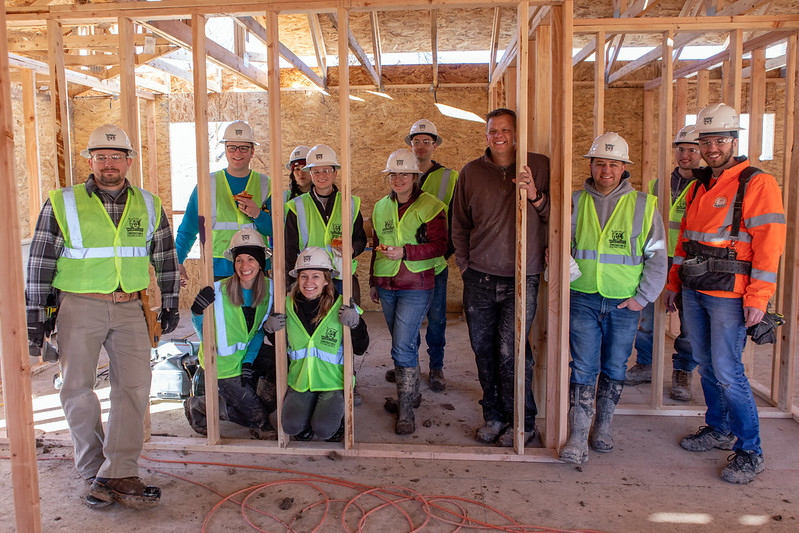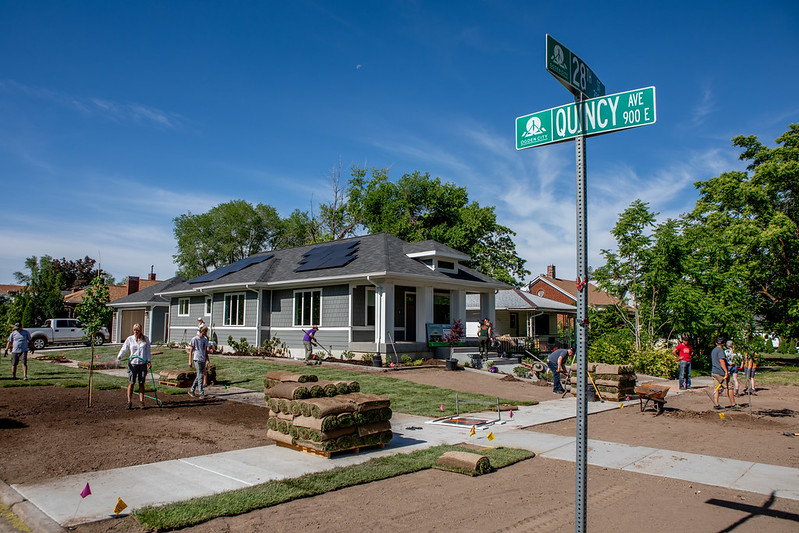Mentoring 101: How to Teach College Students What Textbooks Can’t
Tuesday, September 29, 2020
Most colleges don’t offer a course that can teach you how to navigate the real world. Sure, classroom learning provides students with a solid technical foundation in their chosen areas of study, but essential professional skills like negotiation, compromise, and flexibility aren’t covered in most textbooks. For the answers to life’s most challenging questions, you need a mentor.
If there were degrees in Real Life Experience, a group of more than 30 students from Weber State University would earn top honors. These students managed to design and build a six-bedroom, 2,450 square foot home that is powered entirely by the sun and can go off grid for three days—or longer—as part of their Solar Decathlon 2020 senior project.
Jeremy Farner, an associate professor of building design and construction at Weber State University, served as the team’s faculty advisor on the project. Now that he has successfully advised two Solar Decathlon Design Challenge competitions and Weber State’s most recent Build Challenge, there is no doubt he has what it takes to mentor the next generation of green building professionals.

Jeremy Farner, fourth from right, stands with students on the Solar Decathlon 2020 Build project team representing the Building Design & Construction, Interior Design, and Construction Management programs in February 2020. Photo by Weber State University
“My role is teaching these students, not just architecture and construction, but real-world resolve to work through problems,” said Jeremy. “Those problem-solving skills are essential to dealing with the challenges that life inevitably throws at you.”
A few guiding principles have helped Jeremy succeed in his role mentoring students throughout the Solar Decathlon. Spoiler alert: it’s not all hand-holding and grading on a curve.
Surrender Control
A desire to guide, but a refusal to lead, helped Jeremy ensure that he was empowering his students to make tough decisions and work hard.
“One thing that was clear from our very first class meeting was that Professor Farner was there to support our efforts, but wasn’t ‘in charge’ of the project,” said Ryan Williams, the Weber State team’s quality control lead. “We had to self-organize and work together more as a team than in any other class.”
Working as a team is easy when everything goes right. However, anyone with the most basic DIY construction experience knows that things tend to go wrong, or at best, not as expected. For Weber State, the team had to shift gears after completing a full year of work. They had done all of the demographic studies, completed the design, and were waiting for their property to be rezoned for higher density units. But when it became uncertain whether they could keep waiting and still complete the project by the competition deadline, they made the tough decision to pull the plug on their original plan.

Most students probably would never sign up to take a college course titled, “Whenever something could possibly go wrong on a construction site, it might,” but the Weber State Solar Decathlon 2020 Build Team got a lesson on that topic several times. Photo by Weber State University
“My students weren’t happy with that change. They were mad about abandoning so much hard work, but they knew it wasn’t an option to continue,” said Jeremy. “It would have been impossible for them to succeed with all of their eggs in that original basket.”
That difficult decision provided Janae Thomas-Watson, the Weber State team’s project manager, with her most valuable takeaway from the Solar Decathlon Build experience. “I was able to work with a solid group of dedicated folks who were willing to make hard decisions and sacrifices for the benefit of the build,” said Janae. “This shaped my perspective on a future career path because now I know that I need to align myself with a company and team of colleagues that share my same goals.”
Connect with Movers and Shakers
The team began looking for an alternative project to pursue right away. Fortunately, the City of Ogden, where the university is located, had been trying to revitalize neighborhoods where houses have been repossessed, abandoned, or torn down. Because Jeremy already sat on the Ogden City Civic Action Network, he heard about the group’s desire to build an affordable net zero home to showcase for the community.
When Jeremy’s students learned about this opportunity, they shifted right back into high gear. They started fundraising through the university in October, redid all of the project plans in November, and submitted the design for permitting in December.
Project partners who signed on to the project include the City of Ogden, Ogden Civic Action Network, the Davis Technical College, and multiple subcontractors who could ensure the student’s work met industry standards. Backed by various gift amounts from the College of Engineering, Applied Science and Technology, College of Social & Behavioral Sciences, College of Science, Facilities Management, Provost’s Office, Presidents Council, and Student Affairs, the team was able to break ground on January 4, 2020.
“The university administration was a huge supporter for us,” said Jeremy. “They wanted to involve as many students as possible and give back to the community in a significant way because we believe in the value of civic engagement and service learning.”
Share Your Passion
Now that construction on the Quincy Avenue Solar Decathlon house is complete, the team plans to pass along the gift of net zero living to a local resident. After opening the home for a public exhibition in late August 2020, the school will host a randomized auction to select a buyer from among those who submit a qualifying asking price offer. The appraised value of the home is $355,000, and it’s also worth noting that the house’s electric bills should amount to just over $100 over the course of an entire year—including charging an electric vehicle.

After outfitting Jeremy Farner’s personal home with a solar energy system, ES Solar Contractors stepped up as a local expert willing to provide 39 roof-mounted solar panels for the Weber State team’s Solar Decathlon 2020 Build project. Photo by Weber State University
“A big moment for our team came when the subcontractors started asking if they could buy it. First the framer, then the cabinet guys, the plumber, and our painter,” said Jeremy. “That’s when we knew it was really good.”
There’s only one small catch for the home’s future owner: they must agree to provide two years of utility bills to the university. This will allow Weber State to monitor how their energy modeling matches the home’s actual consumption. In this way, the cycle of giving back continues.
“I grew up around the biz,” said Jeremy. “My grandfather was a general contractor, so I remember telling my parents I wanted to be a wall builder as early as eight years old so I could follow in his footsteps.”
Jeremy’s early dream has now come full circle. He worked as a framer in high school, went to Weber State for undergrad to learn how to be an architectural drafter and designer, was hired as a designer for largest homebuilder in Utah, then completed his master’s research at Purdue in construction management. Now, he is passing along his passion to the next generation by mentoring his students.
“I was initially driven toward architecture, but this project reminded me of the joy that comes from physically creating something that was designed digitally,” said Ryan as he considers his future career plans. “Instead of focusing strictly on design or architecture, I am thinking of more opportunities that could have a meaningful impact and help push the practice of sustainable building.”
Thanks to a great mentor, we’re sure that all of the members of the Weber State Solar Decathlon 2020 Build team will go on to do amazing things in this field. After all, they all have unofficial degrees in Real Life Experience.
